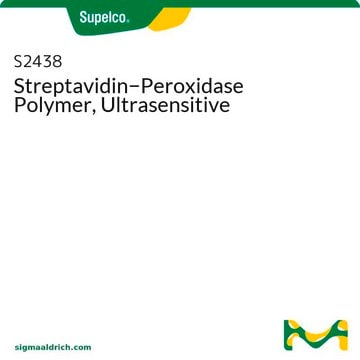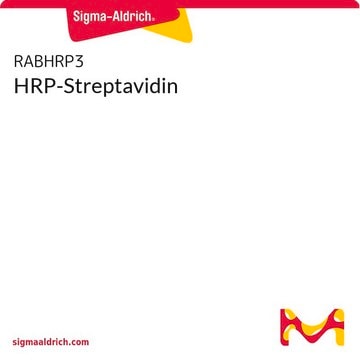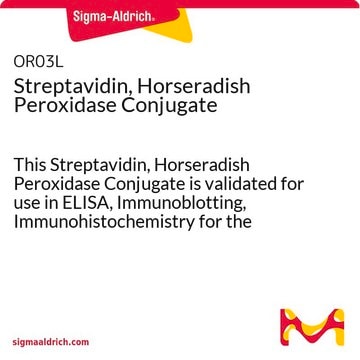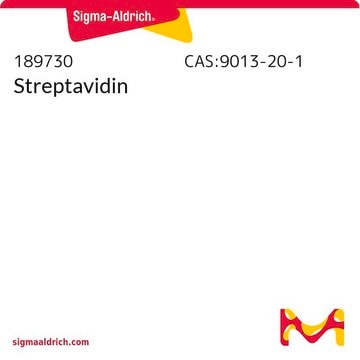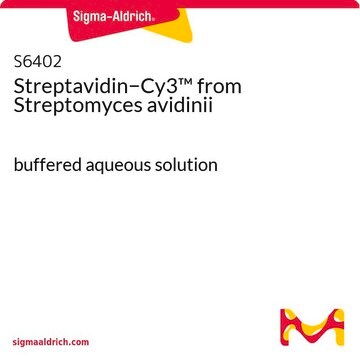S5512
Streptavidin−Peroxidase from Streptomyces avidinii
lyophilized powder
Synonym(s):
Streptavidin−HRP from Streptomyces avidinii
Sign Into View Organizational & Contract Pricing
All Photos(1)
About This Item
Recommended Products
conjugate
peroxidase conjugate
Quality Level
form
lyophilized powder
composition
Protein, ≥70% E1%/280
technique(s)
direct ELISA: 1:50,000
storage temp.
−20°C
General description
Steptavidin is coupled to horseradish peroxidase (HRP) using citrate buffer, pH 6.0, and a modified published procedure to form a 1:1 conjugate. HRP has a molecular mass of ~44kDa and steptavidin has a molecular mass of ~60kDa.
Streptavidin derives its name from its bacterial source Streptomyces avidinii and from the hen egg-white protein, avidin, which has high affinity to biotin. Its homologous core shares 33% sequence similarity with avidin, as well as sharing a common tetrameric structure. It is a crystalline tetrameric protein, with a molecular weight of 4*15000Da. It binds four molecules of biotin. Streptavidin lacks carbohydrate and sulfur-containing amino acids.
Streptavidin is considered as a high-affinity biotin-binding agent, which shows resistance to extreme pH, detergents temperature, denaturants and enzymes, hence it is used in molecular biology and bionanotechnology.
Application
Streptavidin- Peroxidase from Streptomyces avidinii has been used for ELISA (enzyme linked immunosorbent assay) and Enzyme-Linked ImmunoSpot (ELISPOT).
Streptavidin-Peroxidase from Streptomyces avidinii has used as a secondary reagent for detection of biotinylated antibodies in standard ELISA, immunoblotting, and immunocytochemistry procedures.
Biochem/physiol Actions
Streptavidin is an antibiotic that functions by binding to and depleting the essential vitamin biotin from the surrounding environment. Because of its unique properties, streptavidin has found various applications in biological studies, including immunotherapy, immunoassays, hybridization assays, lymphocyte activation, antigen localization, and affinity chromatography.
Packaging
Package size based on protein content
Physical form
Lyophilized powder containing citrate buffer salts.
Preparation Note
Labeled with Type VI peroxidase by a modification of the method of O′Sullivan, M.J., et al., FEBS Lett., 95, 311 (1978).
Purified by affinity chromatography.
Purified by affinity chromatography.
Analysis Note
The optimal working dilution should be determined empirically using a range of dilutions from a 1 mg/mL stock in buffer.
Disclaimer
Unless otherwise stated in our catalog or other company documentation accompanying the product(s), our products are intended for research use only and are not to be used for any other purpose, which includes but is not limited to, unauthorized commercial uses, in vitro diagnostic uses, ex vivo or in vivo therapeutic uses or any type of consumption or application to humans or animals.
Certificates of Analysis (COA)
Search for Certificates of Analysis (COA) by entering the products Lot/Batch Number. Lot and Batch Numbers can be found on a product’s label following the words ‘Lot’ or ‘Batch’.
Already Own This Product?
Find documentation for the products that you have recently purchased in the Document Library.
Customers Also Viewed
Alan V Rincon et al.
General and comparative endocrinology, 281, 117-125 (2019-05-31)
The development of methods to quantify hormones from non-invasively collected samples such as urine or feces has facilitated endocrinology research on wild-living animals. To ensure that hormone measurements are biologically meaningful, method validations are strongly recommended for each new species
C Coetsier et al.
Clinical and diagnostic laboratory immunology, 5(4), 446-451 (1998-07-17)
We have previously described the cloning and sequencing of a gene portion coding for the terminal part of a 34-kDa protein of Mycobacterium avium subsp. paratuberculosis, the etiological agent of Johne's disease (P. Gilot, M. De Kesel, L. Machtelinckx, M.
Onset and duration of fecal shedding, cell-mediated and humoral immune responses in pigs after challenge with a pathogenic isolate or attenuated vaccine strain of Lawsonia intracellularis.
Guedes RM and Gebhart CJ
Veterinary Microbiology, 91(2-3), 135-145 (2003)
J S Stanley et al.
European journal of biochemistry, 268(20), 5424-5429 (2001-10-19)
An enzymatic mechanism has been proposed by which biotinidase may catalyze biotinylation of histones. Here, human cells were found to covalently bind biotin to histones H1, H2A, H2B, H3, and H4. Cells respond to proliferation with increased biotinylation of histones;
Polymer nanoparticles
Progress in Molecular Biology and Translational Science, 104, 299-323 (2011)
Our team of scientists has experience in all areas of research including Life Science, Material Science, Chemical Synthesis, Chromatography, Analytical and many others.
Contact Technical Service